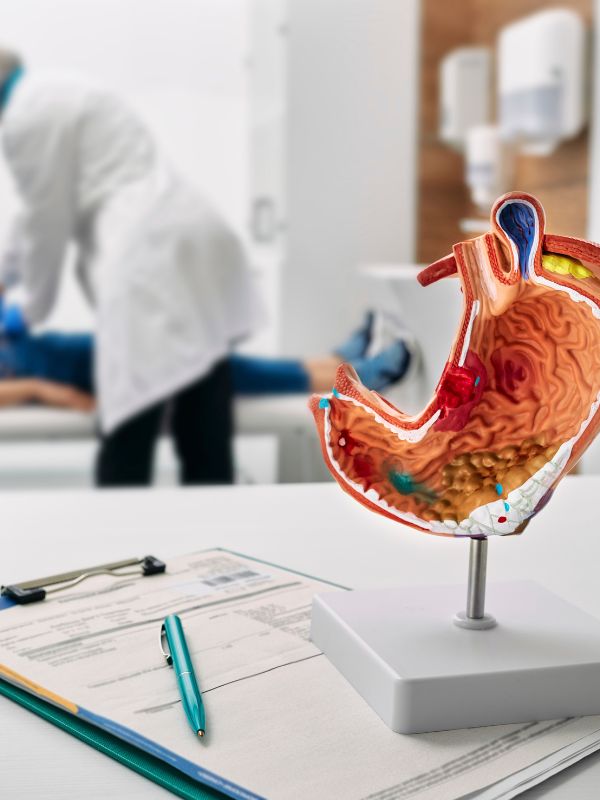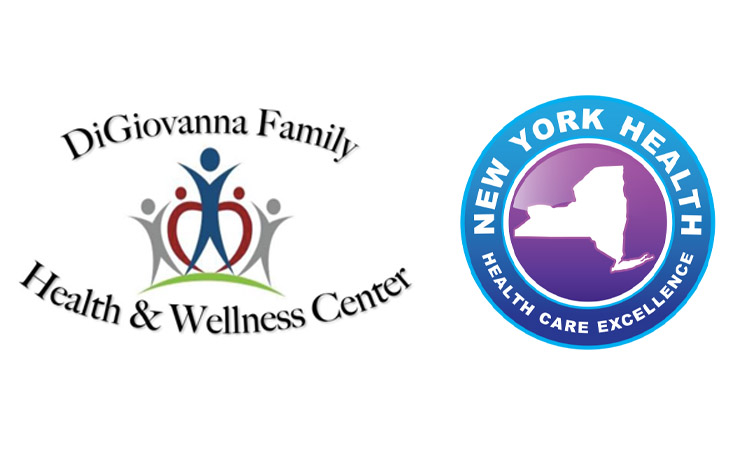GASTROENTEROLOGIC DISEASE AND SCREENINGS
Gastroenterologic Diseases and Screenings
The DiGiovanna Family Health and Wellness Center recognizes the importance of good intestinal health as a preventive measure for many diseases and maladies. Led by Dr. Nilesh Mehta’s group, Digestive Disease Consultants, and Dr. Bernard Stark with many years of clinical experience, the Gastroenterology Department of the DiGiovanna Family Health and Wellness Center is able to provide many gastroenterology screenings and procedures. Dr. Nilesh Mehta and his group are able to provide gastroenterology consultations, upper and lower endoscopies, as well as a wide range of gastroenterology procedures in their state of the art facilities. Dr. Stark has perfected several techniques in gastroenterology which are beyond the scope of many gastroenterology practices. Dr. Stark is able to remove flat and larger colon polyps through the colonoscope which other gastroenterologists referred to him. Dr. Stark is able to perform Endoscopic Retrograde Cholangiopancreatography (ERCP), a procedure where, through a special endoscope called a duodenoscope, a wire is introduced into through the Sphincter of Oddi into the common bile duct for injection of contrast for imaging or for removal of common bile duct stones. Dr. Stark also treats patients with esophageal stenosis using stents to open any obstructions. Other conditions that can be treated by our gastroenterology department are:
1) Inflammatory Bowel Disease including Crohn’s Disease and Ulcerative Colitis
2) Irritable Bowel Syndrome
3) Colon Cancer Screening
4) Clostridium difficile (C. diff) Colitis

INFLAMMATORY BOWEL DISEASE (IBD), CROHN’S DISEASE (CD) AND ULCERATIVE COLITIS (UC)
Inflammatory bowel disease (IBD) is an umbrella term used to describe disorders that involve chronic inflammation of your digestive tract. Types of IBD include:
Ulcerative colitis
This condition causes long-lasting inflammation and sores (ulcers) in the innermost lining of your large intestine (colon) and rectum.
Crohn’s disease
This type of IBD is characterized by inflammation of the lining of your digestive tract, which often spreads deep into affected tissues. Both ulcerative colitis and Crohn’s disease usually involve severe diarrhea, abdominal pain, fatigue and weight loss. IBD can be debilitating and sometimes leads to life-threatening complications.
Inflammatory bowel disease symptoms vary, depending on the severity of inflammation and where it occurs. Symptoms may range from mild to severe. You are likely to have periods of active illness followed by periods of remission. Signs and symptoms that are common to both Crohn’s disease and ulcerative colitis include:
Diarrhea
Fever and fatigue
Abdominal pain and cramping
Blood in your stool
Reduced appetite
Unintended weight loss
The DiGiovanna Family Health and Wellness Center is working very hard to try and find better treatments, and possibly a cure, for these life-altering diseases. Through the DIGiovanna Institute for Medical Education and Research, we are participating in 15 clinical trial involving 3 pharmaceutical companies and 5 different new and novel treatments for CD and UC. If you are interested in learning more about the work that the DiGiovanna Institute for Medical Education & Research is doing in IBD, or if you are interested in participating in these clinical trials, please click the link below.
IRRITABLE BOWEL SYNDROME (IBS)
Irritable bowel syndrome (IBS) is a common disorder that affects the large intestine. Signs and symptoms include cramping, abdominal pain, bloating, gas, and diarrhea or constipation, or both. IBS is a chronic condition that you’ll need to manage long term. Only a small number of people with IBS have severe signs and symptoms. Some people can control their symptoms by managing diet, lifestyle and stress. More severe symptoms can be treated with medication and counseling.
IBS doesn’t cause changes in bowel tissue or increase your risk of colorectal cancer.
The signs and symptoms of IBS vary. The most common include:
Abdominal pain, cramping or bloating that is typically relieved or partially relieved by passing a bowel movement
Excess gas
Diarrhea or constipation — sometimes alternating bouts of diarrhea and constipation
Mucus in the stool
Most people with IBS experience times when the signs and symptoms are worse and times when they improve or even disappear completely. The DiGiovanna Family Health and Wellness Center has worked on treatments and cures for all 3 forms of IBS, Constipation-predominant, diarrhea-predominant and mixed through the DiGiovanna Institute for Medical Education and Research. We have helped to develop a cure for diarrhea-predominant IBS, so that no patient should have to suffer with the symptoms of this disease any longer. We have also developed improved treatments for constipation-predominant and the mixed variety of IBS.
COLON CANCER SCREENING
After skin cancer, colon cancer is the most common form of cancer in men and women combined. The symptoms of colon cancer, particularly early colon cancer, are nonexistent and often lull patients into a false sense that everything is well with their intestines as long as they have no pain, no blood in the stool, no weight loss and normal bowel movements. Early colon cancer is also fairly easy to treat. When discovered as a precancerous or cancerous polyp, the polyp can often be removed right through a colonscope. The best method for treating colon cancer, therefore, is early detection. The DiGiovanna Family Health and Wellness Center follows the American Cancer Society’s (ACS) guidelines for colon cancer screening. Beginning at age 45, and continuing until age 75, routine screening for colon cancer should be performed on men and women alike. The ACS recommends yearly rectal examinations and any of the following screening tests, all of which can be performed by the DiGiovanna Family Health and Wellness Center:
Highly sensitive fecal immunochemical test (FIT) every year
Highly sensitive guaiac-based fecal occult blood test (gFOBT) every year
Cologuard every 3 years – a multi-targeted DNA-based stool test
Click Here to Learn More About Cologuard
Colonoscopy every 10 years
CT colonography (virtual colonoscopy) every 5 years
Flexible sigmoidoscopy (FSIG) every 5 years
CLOSTRIDIUM DIFFICILE COLITIS
Clostridium difficile, often called C. difficile or C. diff, is a bacterium that can cause symptoms ranging from diarrhea to life-threatening inflammation of the colon. Illness from C. difficile most commonly affects older adults in hospitals or in long-term care facilities and typically occurs after use of antibiotic medications. However, studies show increasing rates of C. difficile infection among people traditionally not considered high risk, such as younger and healthy individuals without a history of antibiotic use or exposure to health care facilities.
Each year in the United States, about a half million people get sick from C. difficile, and in recent years, C. difficile infections have become more frequent, severe and difficult to treat. Some people carry the bacterium C. difficile in their intestines but never become sick, though they may still spread the infection. Signs and symptoms usually develop within five to 10 days after starting a course of antibiotics, but may occur as soon as the first day or up to two months later.
Mild to moderate infection
The most common symptoms of mild to moderate C. difficile infection are:
- Watery diarrhea three or more times a day for two or more days
- Mild abdominal cramping and tenderness
Severe infection
In severe cases, people tend to become dehydrated and may need hospitalization. C. difficile causes the colon to become inflamed (colitis) and sometimes may form patches of raw tissue that can bleed or produce pus (pseudomembranous colitis). Signs and symptoms of severe infection include:
- Watery diarrhea 10 to 15 times a day
- Abdominal cramping and pain, which may be severe
- Rapid heart rate
- Fever
- Blood or pus in the stool
- Nausea
- Dehydration
- Loss of appetite
- Weight loss
- Swollen abdomen
- Kidney failure
- Increased white blood cell count
The DiGiovanna Family Health and Wellness Center is committed to preventing and effectively treating this life-threatening infection. Careful selection of only appropriate patients for antibiotic therapy helps to cut the rates of C. diff infection. Working a patient up properly and appropriately, utilizing a good medical history and physical examination, and ordering and interpreting appropriate tests often help to distinguish true bacterial infections, which may require antibiotic therapy, from viral infections, for which antibiotic therapy does not work and often leads to untoward side effects, like C. diff infections. Discovering C. diff infections early in the course of the disease is also extremely important so appropriate anti-clostridium antibiotics can be initiated sooner than later. The DiGiovanna Family Health and Wellness Center, working through the DiGiovanna Institute for Medical Education and Research, as helped to develop new and more powerful anti-Clostridium treatments, as well as therapies to prevent or vaccinate hi-risk patients from contracting C. diff infections. The DiGiovanna Institute for Medical Education and Research is currently participating in clinical trials involving patients with C diff infections. If you, or someone you know, has a C. diff infection, please click the link below to learn more about these ongoing trials.
